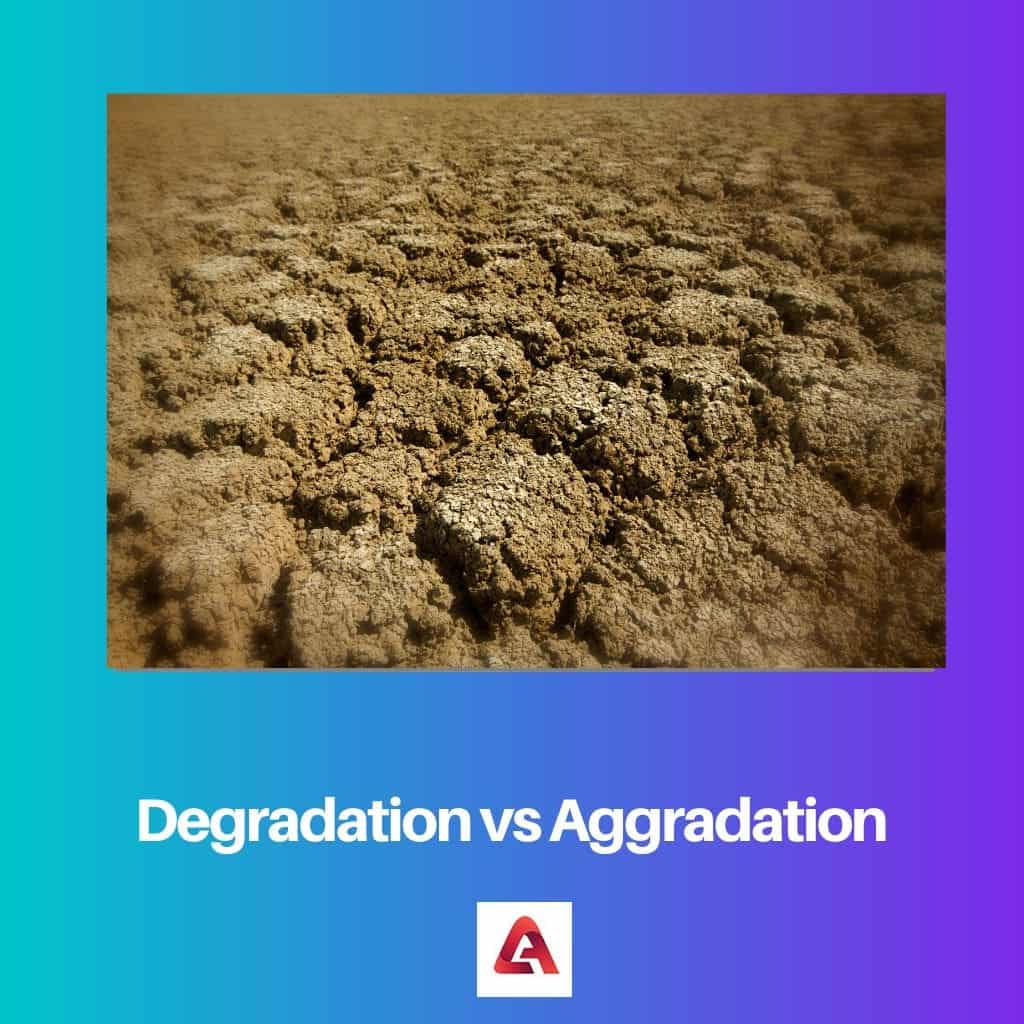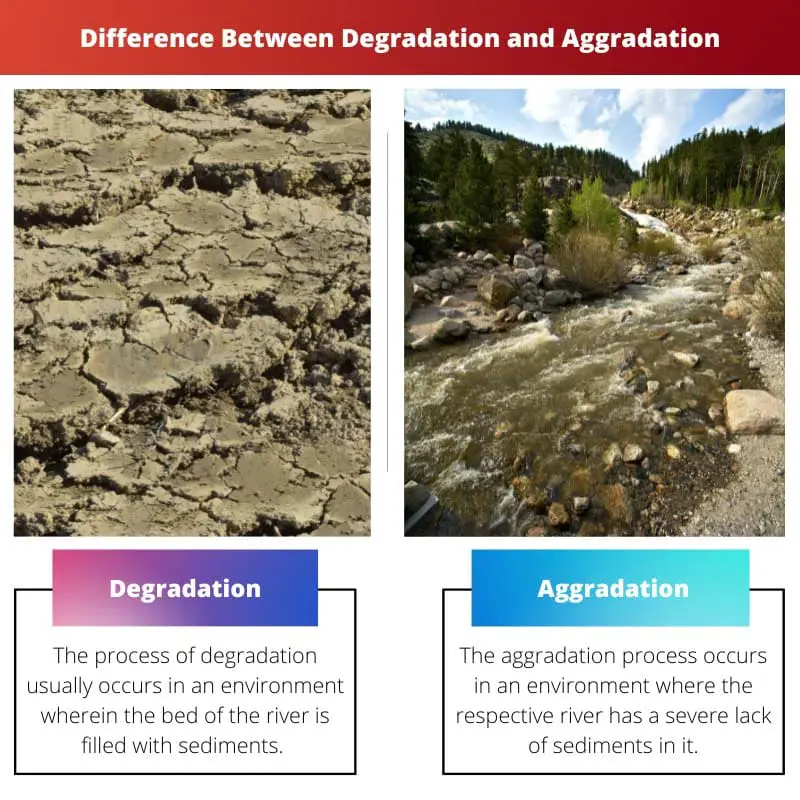Degradation and aggradation are two of the most important aspects of geography.
Both degradation and aggradation together carry out the process of gradation which is the process of levelling of land by natural agents and processes such as wind, glaciers, rivers, waves, and so on.
Aggradation and Degradation are processes that get rid of the unevenness of the land.
Key Takeaways
- Degradation refers to the process of lowering the earth’s surface due to erosion, while aggradation is the process of raising the surface through sediment deposition.
- Degradation can lead to the formation of valleys, canyons, and other erosional landforms, while aggradation contributes to the development of deltas, alluvial fans, and floodplains.
- Both degradation and aggradation are crucial in shaping landscapes and influencing water flow in rivers and streams.
Degradation vs Aggradation
Degradation is the process of breaking down of a land surface. It can be caused by natural processes such as erosion, weathering, or human activities. Aggradation, is the process of building up a land surface. It can occur through deposition of sediment, or growth of living organisms.

Degradation is a naturally occurring process that reduces the overall size of the river bed by eroding the sediments settled within the base of the river.
The process is accelerated by several factors including but not limited to an increase in kinetic energy or the influence of humans and animals.
Aggradation is a process that is associated with the process of deposition since it deposits particles and specifically sediments to the river bed which increases the size of the river base.
Aggradation is a process that happens over time with the possible interference of naturally occurring ecological bodies such as plants.
Comparison Table
| Parameters of Comparison | Degradation | Aggradation |
|---|---|---|
| Effect on Riverbed | The degradation process reduces the base of the river bed by removing the accumulated sediments with the help of naturally occurring bodies. | The process of aggradation substantially increases the size of the river base or the river bed by accumulating sediments in it. |
| Environment | The process of degradation occurs in an environment wherein the bed of the river is filled with sediments. | The aggradation process occurs in an environment where the respective river has a severe lack of sediments in it. |
| Process Associated With | The process of degradation is associated with the geological process of erosion since the sediments are removed from the rivers. | Aggradation is associated with the geological process of deposition since aggradation deposits sediments in the river base over a specific period. |
| Type of an Energy | Degradation occurs in rivers with increasing kinetic energy since this would accelerate the process of erosion from the river bed. | Aggradation is associated with the deposition of sediments in rivers and decreasing kinetic energy would be conducive to this process. |
| Elements involving the process | Degradation is affected by the interference of humans due to the building of dams or by melting glaciers due to global warming. | Aggradation is more affected by naturally occurring ecological elements such as aquatic plants, whose roots will increase the levels of aggradation. |
What is Degradation?
Speaking on geological terms, the process which reduces the level of a river and subsequently the river bed due to the removal of accumulated sediments is known as degradation.
This process happens when there is a gradual increase in the kinetic energy within the river which prevents the sediments to remain settled and stable across the river bed or the bottom of the river.
Elements of erosion are involved within the process of degradation where the sediments are forced to be scrapped along the bottom of the river.
The particles of sediments will be shoved off the river due to natural or man-made occurrences.
The process of degradation will cause the water levels in the respective river to get deepened with time since the sediments will be forced off the river.
Degradation is a common sight in rivers with a starving level of sediments since that would be conducive to the process.
The processes which accelerate the process of degradation include the sudden rush of melted water from a glacier. There is a lot of human involvement in the process of degradation.
Human beings have been severely affecting the natural ecological processes by increasing their presence in most of the regions. The construction of dams and other artificial bodies facilitates the rapid acceleration of degradation.
What is Aggradation?
The process through which sediment particles are built up with time in rivers or similar naturally occurring bodies is known as aggradation.
Bodies such as rivers have consequences on the overall landscape of a particular region since they may carry out the processes of deposition and erosion.
When a particular river is low on kinetic energy, this would facilitate the process of sediment deposition and thus carry out the process of aggravation.
The process of deposition and aggradation would increase the overall level of the riverbed due to the easy deposition of sediments. The base level of the river will eventually rise.
A base level of a river is the place in the riverbed where the river cannot flow into. Aggradation occurs easily in a river that is already filled with sediments since they have low kinetic energy levels as well.
There is a particular type of river known as a braided river.
These braided rivers are extremely conducive to the process of aggradation since they have very high levels of sedimentary particles in their river beds.
They also enjoy low kinetic energy levels which allow the deposition of materials in the base of the river.

Main Differences Between Degradation and Aggradation
- Degradation is the overall reduction in levels of the river bed due to the process of erosion, whereas aggradation is the overall increase in the levels of the river due to the deposition of sedimentary particles.
- Degradation is conducive in rivers and other natural bodies wherein the sedimentary levels are low, but aggradation is accelerated in rivers where the sedimentary particles are found in abundance.
- The process of degradation occurs when the sedimentary particles in the base of the rivers are forcefully scrapped out, and on the other hand, aggradation occurs after the deposition of materials.
- The process of degradation thrives in rivers with high kinetic energy since it would be easier to erode the materials from the river bed however, aggradation is a process that happens only in rivers with low kinetic energy since that way the materials would be deposited easily.
- Degradation is severely accelerated by the involvement of human beings and animals such as beavers making artificial dams since they increase the overall kinetic energy levels, on the other hand, aggradation is accelerated by the occurrence of naturally occurring elements such as plants which substantially stabilize the river base and the bed.

- https://www.jstor.org/stable/986220
- https://www.taylorfrancis.com/books/mono/10.4324/9781315685366/land-degradation-society-piers-blaikie-harold-brookfield
